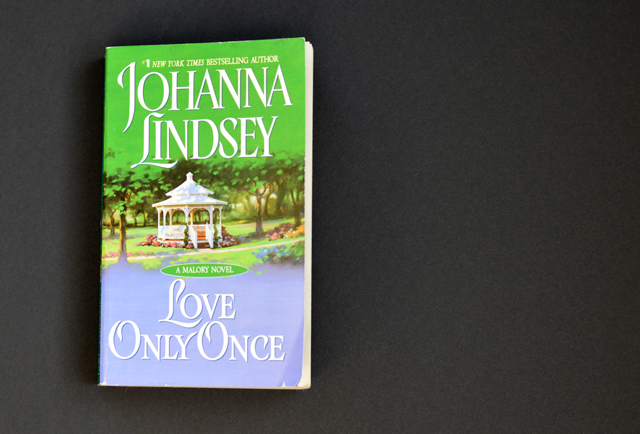The theme for this month’s TBR Challenge was More Than One: a book by an author you have more than one of in your TBR pile. So I chose Love Only Once, the first book of Johanna Lindsey’s acclaimed Malory Family series. I also have Tender Rebel
(which I’m trying to read, but good grief is stupid Scottish dialect making it difficult) and Gentle Rogue
, which is the one I actually wanted to read because PIRATES. But I was told I should read the Malory books in order because we meet the hero of Gentle Rogue for the first time in Love Only Once. James Malory is heroine Regina Ashton’s uncle and he comes into the story the SECOND time the heroine gets kidnapped in this book. Yes, that’s right. She gets kidnapped twice in the same book by two different men. It’s delicious. But I’m getting ahead of myself.
The basic story here is that virgin orphan Regina Ashton is kidnapped by mistake by the former lover of a woman whose carriage she borrows to do a quick errand. Nicholas Eden is a dissolute rake: a despoiler of young aristocratic maidens and drunken racer of horses. Though Regina is returned unsoiled to her family, of course the two are found out and society’s rules dictate that Regina and Nicholas must marry. This is to Regina’s delight (she thinks he’s hot) and Nicholas’s horror (he has a DARK SEKRIT that he thinks he needs to protect Regina from). Of course, all works out in the end.
For any lover of historical romance, this plot is a familiar one. That said, there are a couple differences here between Love Only Once and some, in my view, worse examples of this plot. First, I think it’s poking subtle fun at the kidnapped virgin trope. Regina is kidnapped by the rake, who thinks she is his former mistress, and returned unmolested to her family. Plus she is actually attracted to the hero and not at all scared (really, really not scared, not just trying to be brave). This is reinforced by a SECOND kidnapping–this time at the hand of her own uncle. That’s gotta be a joke, right? Look at The Flame and the Flower for a different example: frightened, kidnapped virgin orphan is mistaken for a prostitute and raped by her captor. Definitely not what happens here (page 64, Nicholas starts).
“I want to kiss you again before you go.”
“No.”
“Just a good-night kiss.”
“No.”
His free hand cupped her cheek. He hadn’t bothered to collect his gloves or hat before they left his house, and his bare fingers were hot against her skin. She couldn’t move, and she waited breathlessly for him to steal the kiss she had refused him.
He did, his lips moving in to fasten on hers for a kiss that was nothing like any kiss she’d had before. Warm and masterful, his lips tasted hers until she thought she would explode.
She waits breathlessly, his lips are warm and masterful, she thinks she’s going to explode. Though she says no, she’s standing on her uncle’s front step at this point. She could summon help if she desired it, duck his kiss, slap him–these are options we’ve all exercised at some point, right? But she really wants Nicholas. Not that this isn’t problematic (she still said no–he still disregarded it), but it’s a pretty mild example for this point in the history of historical romance. And when they do finally get to the point of sex, the heroine is not exactly the sexual aggressor, but she is most definitely a willing participant (page 130):
Deep down Reggie knew that Nicholas was not going to be satisfied with just kissing her, not this time. But a voice inside her demanded to know why she wanted to stop him.
He was going to be her husband, wasn’t he? Why should she deny him anything–especially when she didn’t want to deny him anything?
They go on to have mutually satisfying sex in the garden. Then later in the book, Nicholas “forces himself on her” which I put in quotes because it’s one of the milder forced seduction scenes I’ve seen. Plus Reggie gets playfully chased around the bedroom and throws a book at Nicholas’ head before succumbing. Then this in the aftermath (page 313):
What a marvelous way to be awakened, Reggie thought, snuggling closer to the solid length of her husband. And she wasn’t tired, even though she had been loved ardently into the small hours of the night. Not tired. Feeling wonderful. She would have to insist he force himself on her more often.
It may seem like I’m going out of my way to excuse Nicholas’ actions, but this book was published in 1985. During my recent Utterly Unscientific Summer Saturday Series Sex Survey, I’ve been exposed to many, many examples of women feeling guilty about their desires, being forced by their heroes into kisses and more, and there was very little premarital sex. By contrast, the historical romance of the period, including Love Only Once, looks almost progressive. When I expressed this opinion on Twitter this week, romance historian Kelly Faircloth confirmed that in Janice Radway’s 1984 book, Reading the Romance: Women, Patriarchy, and Popular Literature, some of the women interviewed about romance expressed a similar sentiment.
@elisabethjlane what’s interesting is the women interviewed for Reading the Romance said something similar at the time
— Kelly Faircloth (@kellyfaircloth) June 11, 2015
@elisabethjlane most of them were historical fans and there are several comments expressing frustration with HQNs of the time
— Kelly Faircloth (@kellyfaircloth) June 11, 2015
Between Regina’s own self-confidence, her station in life, her financial resources, and the protection of her family, she is a formidable woman despite being a type (virgin orphan) that historical romances often portray as exceedingly vulnerable. In a society that gives very little autonomy or agency to women, Regina is constrained in a lot of ways, but she twists those constraints to get exactly what she wants (marriage to the dreamy-gorgeous Nicholas). I liked that she had everyone wrapped around her little finger, the sly little fox. Nicholas is another matter. If you’re a reader who reads for heroes, you’ll likely not be terribly happy with this book. Nicholas is obtuse, whiney and petulant. He eventually gets over it thankfully, but I doubt he’ll ever be anyone’s favorite hero.
So that’s Love Only Once. My understanding is that the knowledge gained about James Malory is worth the read before getting to Gentle Rogue. And this truly wasn’t a bad book. I’ll admit to some trepidation going into these older romances, but this one is pretty harmless, if not necessarily brilliant or astonishingly well-written. It certainly can’t hold a candle to my favorites from this period of romance and I admit to not fully getting the Johanna Lindsey hype. But I will press on with at least the next two books of the series. Because PIRATES.





